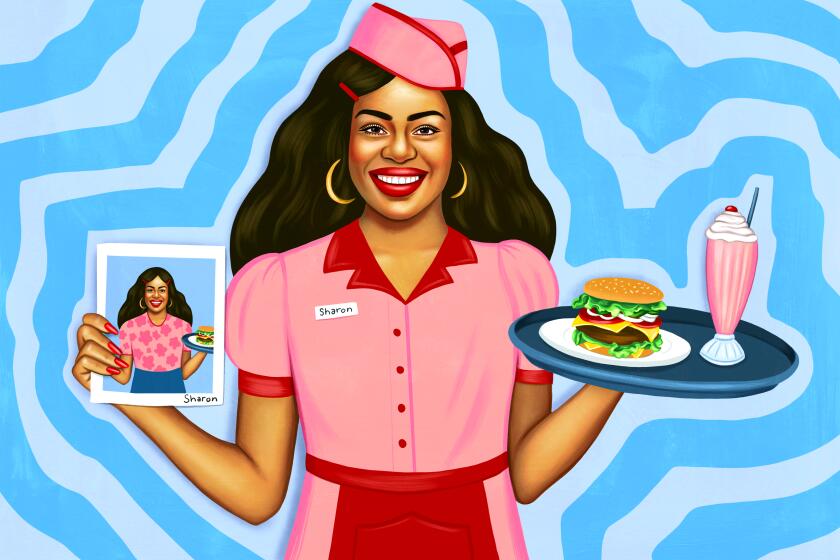Explaining Hollywood: How to get a job as an actor in film and TV

In the early 2000s, Rodney To’s acting career didn’t seem like it was going anywhere. He’d always assumed that he’d act until he couldn’t get away with it anymore, and after about five years of struggling, he thought: “This is probably the beginning of the end.”
At the time, To was part of a tight-knit community of Asian American actors in New York who knew each other from the waiting rooms where they’d line up to audition for the same parts.
One day, a friend came back from a really bad audition and suggested that they all go to an open mic event at a library and read their “sides” — the small sections of the script that actors are given before an audition — verbatim.
Lampooning the audition process was cathartic. The routine eventually evolved into the play “Sides: The Fear Is Real...,” which built a cult following and won To and his friends an ensemble performance award at the 2003 New York International Fringe Festival.
The show traveled to Los Angeles, and the buzz attracted Hollywood industry people. That’s where To met a woman who’d end up being his agent for the next 16 years. What looked like the inevitable end of To’s acting career in New York turned out to be the beginning of a new chapter in L.A.
People often see only the most glamorous aspects of being an actor — the parts that involve lights, camera and action, and the promotion of the finished project.
But for most film and TV actors, professionals say, the job is auditioning. You spend most of your time reading and performing sides — and getting rejected. The fear is real.
Some of the auditions will be great. Others will frustrate you. You might learn to enjoy the process. Or it might drive you to create your own content — and in To’s case, keep you in the industry for at least another 20 years.
To learn more about what it’s like being an actor for film and TV, The Times spoke with actors To, Ben Whitehair, Carolyn Michelle Smith, Behzad Dabu, Amy Hill, Sergio Calderón, Adam Faison and Annie Gonzalez, as well as actor-turned-casting director Tanya Giang. Here are some of their insights.
Who becomes an actor?
Actors are storytellers, said Dabu. They also tend to be “intelligent listeners” who are highly attuned to all the different ways people communicate.
So much of how we communicate is nonverbal, he said, adding: “It is in our volume, it is in our intensity and it is in our body language. Someone who understands that lends themselves to being a good actor.”
Actors are also people who are curious about human behavior and psychology, he said.
“As an actor, you can’t judge your character,” Dabu said.
Case in point: For two seasons of “How to Get Away With Murder,” he played Simon Drake, a character many viewers found irritating because he always clashed with the show’s leads. But Dabu insists that Simon was misunderstood and was “just trying to stand up for the innocent people who were working hard in class.”
Dabu thinks actors tend to be empathetic people. “They’re always looking for justifications for why people do the things they do,” he said.
And it might sound obvious, but actors need to love performing, professionals said. You have to love it so much that you’re willing to do things that you don’t always want to do to get paid to act, — whether that’s juggling multiple side jobs to support yourself financially or taking any role that comes your way.
Those who decide to pursue acting quickly realize that the time spent on a film or TV set is very limited, said Whitehair, executive vice president of SAG-AFTRA.
“People come out of high school and college, they’ve been acting in theater their whole lives, they’ve been cast in every single school play, and that’s just a very different lifestyle than a working actor,” he said.
Many working actors liken the lifestyle to that of owning a small business. You have your own talent, marketing, customer service and community outreach departments, said Dabu.
Like with any small business, it takes time, energy and money to get an acting career off the ground, Whitehair said, adding that there is a tremendous amount of luck involved.
The actors who have longevity are people who are committed to building a life of emotional resilience, said Smith.
“Actors are athletes of the heart,” she said. “It’s our job to not run away from these emotions but to dive into them. You have to be extra, extra good at [managing] that.”
Being an actor is a job that everyone thinks they understand. But do we?
How do you get started?
“I always tell actors to go on IMDb,” Whitehair said, referring to the Internet Movie Database. “Look up your favorite actors, and look at the year of their very first credit. That probably didn’t happen on Day 1. It probably took a couple years.”
Most of the time, there are many steps before an actor can even audition, professionals said.
Step 1 is training. All the pros The Times spoke with agree that training — and continuing to train even when you start getting work — is essential to having a career as an actor.
Training shifts the way you receive information, said Smith. A trained actor can be given notes and direction and adjust without disrupting their natural flow.
There are many ways to get training. You could get a theater degree at a college or university. There are acting conservatory programs. There are classes focused on various acting techniques.
There are also classes that teach specific skills, including scene study, character study, auditioning and improv, which can help actors loosen up, Giang said. She added that some newbies might want to start by focusing on a class that teaches acting for commercials, because it’s easier to break in there.
For actors who can’t afford classes, Giang encourages them to think out of the box: “Do acting challenges on TikTok or YouTube.” There are also a lot of classes available online.
The goal is to eventually get booked for roles that will give you on-the-job training.
Second, you typically need representation — an agent who submits you for jobs and negotiates contracts, and a manager who guides your career — in order to get auditions for major networks and streaming services, professionals said.
But first, you need head shots, a resume and a reel. So how do you create a reel of work before you’ve booked anything?
There are casting networks and websites — including Actors Access and Backstage.com — that list auditions, also known as breakdowns, that you can submit yourself to before you have an agent, Dabu said. These are typically for smaller projects: short films, commercials, web series and social media sketches, he said.
The process can be a grind. “Let’s say you submit yourself to 30 projects, two get back to you, you do those two auditions and you don’t hear anything. Tomorrow, submit yourself to 30 more projects.”
While you’re getting used to rejection, make your own stuff, professionals advise. Even if you just get your friends together and piece some clips over a few months, you can cobble create a reel to submit to agents and managers who focus on discovering new actors, Dabu said.
Actors have to do a little behind-the-camera work for auditions these days. Don’t worry — creating your self-tape audition is not as hard as it seems.
What are the career paths?
Experts agree that there is no one path and no set timeline for the career of an actor.
But there is a general hierarchy, said Dabu. For most working actors, you start with agents and managers who specialize in getting less-experienced actors auditions for smaller jobs, and then you eventually work your way up to the higher-profile agents and managers, who can get you auditions for bigger jobs, he said.
The only way to fast track to the top is if a casting director or filmmaker chooses you for a role that’s much bigger than the one you did before. “But you can’t do anything to get that fast track,” he said. “It either happens or it doesn’t.”
Dabu breaks down the different acting levels in television this way:
- Background actor: These actors used to be called extras. They don’t have any lines, but they help create the atmosphere of the scene.
- Bit role, co-star or “under-5”: These are small speaking roles. For example, Dabu said, “If the lead characters go to a Starbucks, you’re playing the Starbucks employee who says, ‘Here you go, sir,’ and you hand them their coffee.”
- Guest star: This is a role that affects plot. For example, a guest star could be the lead’s mother who is coming to town to cause drama. “Just to be very honest, in Los Angeles for an actor starting out, it takes years to get guest star auditions,” he said. “Because you have to go through the process of getting a rep who is legitimate enough to get you guest star auditions.”
- Recurring guest star: This is a character that affects plot for multiple episodes.
- Top of show guest star: This is when your name comes up in the credits at the beginning of the show. “That means not only does your character affect the plot but also that you are an actor of a certain status or with a certain company that has earned you top of show status.”
- Series regulars: These are the characters you see in every episode of the show. This is when you make a lot of money, Dabu said.
There are similar levels for acting in film: extras, featured extras, supporting roles, supporting leads and leads.
For many people who pursue entertainment as a career, it takes years to get yourself to where you are making money from your creative work. For making money in the meantime, there’s always waiting tables. But more and more people are turning to platforms like TikTok, Twitch and Patreon.
How do you make money? (And what kind of money?)
As is common in the entertainment industry, getting into the union is key to getting paid more for your work as an actor. For most actors, though, it takes at least a couple of years to book jobs that will qualify them for membership, Whitehair said.
There are two primary routes to get into SAG-AFTRA: You get a job on a union project, or you do work as a member of an affiliated union, such as the American Guild of Musical Artists or the American Guild of Variety Artists.
How do you get a job in a union project if you’re nonunion? A producer can file a Taft-Hartley form to hire a nonunion actor if they can’t find a union one to fill the role.
“A common example would be if they need a person who has a particular skill,” said Whitehair. “For example, if the character speaks Farsi, they might petition to hire a nonunion actor, and then [the actor] becomes eligible for the union.”
SAG-AFTRA has a number of rate sheets that dictate the minimum amount of pay that its members make for a given production.
The amount for an episode might seem high at first glance, but keep in mind that most actors are not booking gigs throughout the year, Dabu said.
Well into your acting career, you might book only two $9,000-an-episode guest star roles a year. And most working actors take home only about 40% of their check, Dabu said. The rest is going to your agent, manager, lawyer, the union and taxes.
“You’re not really making a living wage until you’re a top of show guest star, or you have a significant recurring guest star role,” said Dabu.
The reality is that most actors have another job that makes them money, professionals said.
“We gotta get rid of this notion that having a job that puts a roof over your head is somehow temporary,” To said. “Sometimes providing for myself meant doing work that’s outside of being an actor. And that’s totally fine.”
It’s important to understand that once you get into the union, you’re agreeing to stop doing nonunion work for any work covered by the SAG-AFTRA contract, Whitehair said. Statistically, that limits your options, but it’s the union work that will offer protections and set you up for more career successes, he said.
For most people who write for film and TV, the gigs are anything but steady. So while the strike is a more definitive interruption, this is a workforce that’s accustomed to finding other ways to make ends meet.
How is this career different than it was 10 or 25 years ago?
The marketplace for actors has changed dramatically, said Smith.
In previous generations, actors put most of their emphasis on training, she said. And while mastering the craft is still important, actors are more focused now on expanding beyond the traditional confines of an actor — and they have more opportunity to do so.
Smith coaches and mentors young actors, and she said their references for success are actors like Michaela Coel and Quinta Brunson, who also write and produce. Or Tabitha Brown, an actor, author and media personality who’s gained a massive online following with comedic videos about veganism.
“It’s about being a maker,” Smith said.
Nowadays, it’s about having the self-awareness to figure out what you’re drawn to as a performer — even if it’s not a conventional acting role — and what’s needed in the new marketplace, Smith said.
The pros The Times talked with agree that there are more opportunities to craft your own life and career as a Hollywood actor than ever before.
That said, the current writer’s strike is shutting down productions, so now is an especially difficult time for most industry members, including actors. The ongoing negotiations by the Writers Guild of America and the Alliance of Motion Picture and Television Producers will almost certainly affect the livelihoods of Hollywood professionals for years to come.
The 2023 writers’ strike is over after the Writers Guild of America and the Alliance of Motion Picture and Television Producers reached a deal.
What advice do pros always hear that is wrong?
Don’t let anyone tell you that you’re too old to start acting, said Giang.
“Think about any television show or movie,” she said. There are roles for actors of all ages. She also noted that “most people who do background work on set are older.”
It’s also not helpful to compare yourself to anyone, pros agreed.
Actors can feel like they’re being pitted against each other, said Faison. But a lot of actors’ insecurities come from a scarcity mind-set, when people feel like there are limited opportunities, he said.
It’s easy to get stuck in jealousy, Whitehair said.
“But for me, I’ve been in L.A. 14 years now, and to see people I knew in college or an acting class now be on a show — it’s so exciting to me,” he said. “And it proves to me that it’s possible. This isn’t a ‘celebrity.’ This is my buddy, my friend.”
Actors who have chosen to pursue Hollywood later in life as a second career share their experiences and advice.
What’s some good advice?
Audition for the casting directors, not for the specific role. Instead of trying to guess want the casting directors want, Dabu said, it’s better to showcase your personal strengths. Giang agreed, saying: “It’s my job to remember you for any role I ever cast in the future.”
Make the most of any time you’re on set. When you get the chance to work on set, think about everything you can do in the moment to help you get your next role, said Smith. That can mean showing up on time, being respectful and making everyone else’s job easier. It can also mean learning how different departments work or connecting with like-minded people you might want to collaborate with in the future.
Have a wellness plan. “We have these highs, because we’re on set, working with great people, living the dream,” Smith said. “Then it ends, and we plummet. That’s very common among actors.”
Gonzalez thinks all actors should consider therapy. “We’re constantly going through the process of healing and breaking down, and sometimes your body doesn’t understand that it’s imagination, and it feels real,” Gonzalez said.
Make good use of your copious down time. That’s when you should update your social media and all your materials, Smith said. Make sure you’re a member of all the actor websites. Make lists of people you’ve worked with and who you’d like to work with. See what connections you have. Start thinking about passion projects. Soak up culture. And rest.
“Now you see it as a gift of time, not a curse,” Smith said. “The reason it’s a gift is because you could be creating your next project.”
Find a way to fall in love with auditioning. “You’re going to have to do it a lot,” Gonzalez said. “Don’t think about whether you’re going to book it …. It’s an opportunity to play, even if it’s just you, your reader and your camera.”
Don’t attach yourself to any one part or vision of what your acting career should look like. “You work really hard, and you think you’re perfect for a role,” Dabu said. “But you can’t let the losses or the rejections get to your heart.”
“Failure would be if someone told me I couldn’t act anymore,” Whitehair said. “If you’re a lawyer and you don’t pass the bar, you can’t be a lawyer. If you flunk out of med school, you cannot be a doctor. And you can always be an actor. Don’t let anybody tell you you can’t.
“It may take longer than you thought it would. Daily life might look different than you thought it would. But you can always be an actor. You can always tell stories.”
Rejection and uncertainty are part of working in Hollywood, but joy, creativity and fun can be too. Here’s how to manage your mental health.
More to Read
Inside the business of entertainment
The Wide Shot brings you news, analysis and insights on everything from streaming wars to production — and what it all means for the future.
You may occasionally receive promotional content from the Los Angeles Times.


















